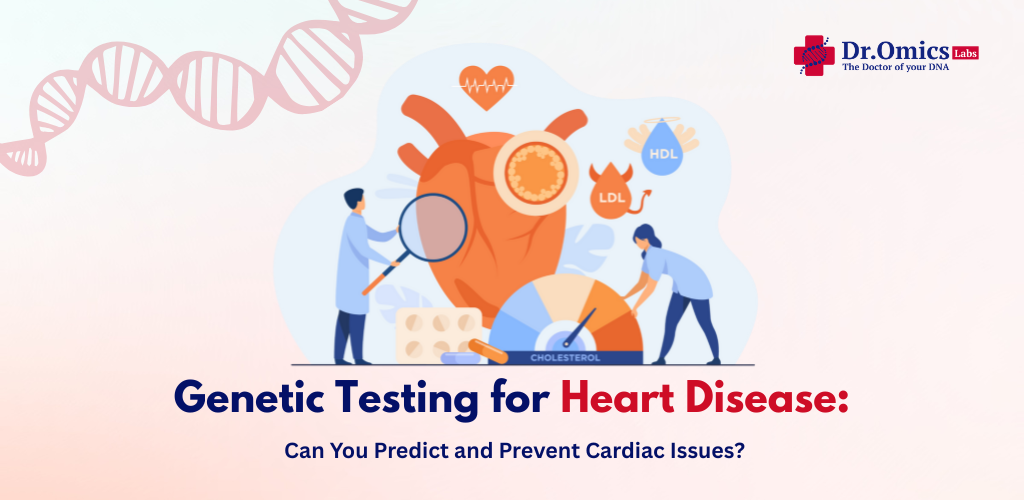Genetic Testing for Heart Disease: Can You Predict and Prevent Cardiac Issues?
Introduction: why genetic testing for heart disease matters more than ever
Heart disease is still the world’s leading cause of death—and many people at risk never show warning signs before their first cardiac event [4]. This silent threat makes early detection extremely challenging. Traditional risk factors like cholesterol and lifestyle explain part of the picture, but they often fail to identify asymptomatic individuals who go on to suffer heart attacks or strokes.
Here’s where genetics flips the script. As much as 40–60% of coronary artery disease (CAD) risk is inherited [4], yet this invisible risk is rarely evaluated in primary care. Cardiac genetic testing offers a novel way to uncover that hidden danger—before symptoms arise and even in people who appear healthy.
Thanks to powerful tools like heart disease DNA tests and inherited heart disease DNA analysis, clinicians can now detect high-risk individuals from birth, optimize treatments like statins or aspirin [1, 4], and initiate preventive strategies based on your unique DNA.
What Is a Heart Disease DNA Test?
A heart disease DNA test, also known as a cardiac risk genetic test or cardio DNA analysis, evaluates your genome for mutations or variants associated with cardiovascular conditions. These tests can identify:
- Monogenic mutations causing familial hypercholesterolemia (FH) or hypertrophic cardiomyopathy (HCM)
- Multiple polygenic risk markers that collectively increase susceptibility to atherosclerosis or arrhythmias
- Pathogenic variants in genes like LDLR, PCSK9, APOB, MYH7, and MYBPC3 are strongly associated with heritable heart diseases. LDLR, PCSK9, and APOB are primarily linked to familial hypercholesterolemia, while MYH7 and MYBPC3 are major genes in hypertrophic cardiomyopathy [3, 5, 6]
This kind of analysis moves beyond symptom-based diagnosis to molecular-level prevention.
Clinical Utility: From Prediction to Personalization
Genetic testing adds value in multiple cardiovascular contexts:
- Enhanced Risk Stratification: Individuals with a high Genetic Risk Score (GRS) for CAD have been shown to have up to a 91% relatively greater risk of cardiac events. The absolute risk will depend on other individual factors. When combined with lifestyle factors, this enables stratification that outperforms conventional models. [4]
- Targeted Pharmacotherapy: Knowing one’s genetic profile helps predict who benefits most from aspirin therapy, statins, or PCSK9 inhibitors—avoiding the “one-size-fits-all” approach in cardiac prevention. [1, 4]
- Family-Based Screening (Cascade Testing): If a patient is identified with an inherited variant, biological relatives can be tested early to detect risks before disease manifests. This approach is especially vital for familial hypercholesterolemia and inherited arrhythmia syndromes. [2, 3, 5]
- Diagnosis and Etiology Confirmation: In syndromic or idiopathic cases of cardiomyopathy, genetic testing confirms diagnosis and sometimes reveals treatable or actionable causes, guiding therapeutic decisions. [1, 5, 6]
Inherited vs. Polygenic Cardiac Risk: What’s the Difference?
Cardiac conditions can be Mendelian (monogenic) or polygenic in origin:
- Monogenic diseases include Brugada Syndrome, Long QT Syndrome, CPVT, DCM, HCM, and FH. These frequently follow autosomal dominant inheritance and manifest in younger individuals. [3, 5, 6]
- Polygenic risk, measured via tools like GRS, accumulates small effects from dozens or hundreds of common SNPs. This type of risk is often underestimated in young and asymptomatic individuals, making GRS-based testing a crucial predictive layer. [4]
Combining both approaches—monogenic screening and GRS profiling—provides comprehensive cardiac risk insight.
Next-Generation Sequencing: Enabling Rapid, Affordable Testing
The use of next-generation sequencing (NGS) has made multigene panel testing more efficient and cost-effective. Unlike traditional Sanger sequencing, which targets one gene at a time, NGS screens dozens to hundreds of genes simultaneously with high sensitivity. This technological shift has enabled widespread availability of:
- Inherited heart disease DNA tests
- Whole exome or genome testing in complex cases
- Prenatal or pediatric screening in specific cases for congenital heart defects (CHD), especially when there is a family history or syndromic features.
Today, many commercial platforms offer tailored cardiovascular gene panels, and even direct-to-consumer DNA kits now explore cardiovascular markers—though clinical interpretation must remain physician-guided. [1, 5, 6]
Lifestyle Still Matters: Genes Are Not Destiny
One common misconception is that genetic risk implies inevitability. That’s simply false.
A landmark study involving over 55,000 individuals found that people with high genetic risk who maintained healthy lifestyles had nearly 50% lower event rates compared to those with poor habits. In fact, physical activity, diet, and smoking cessation significantly offset high genetic risk scores. [4]
Thus, a cardiac risk genetic test isn’t a sentence—it’s a strategic advantage.
When Should You Consider a Genetic Test?
You should strongly consider genetic testing for heart disease if:
- You have a first-degree relative who suffered sudden cardiac death, heart failure, and early-onset heart attacks
- You or your family have a history of high LDL cholesterol, especially if it’s resistant to therapy
- You’ve been diagnosed with arrhythmias or cardiomyopathies without a clear cause
- You’re considering long-term preventive therapy (e.g., statins, aspirin) and want to stratify benefit vs. risk
Challenges and Cautions:
Despite its promise, genetic testing is not without caveats:
- Variants of Uncertain Significance (VUS) can complicate interpretation
- Genetic results may have psychosocial impacts on patients and families
- Insurance coverage and clinical integration vary between countries and systems
- Counseling is essential, especially when dealing with autosomal dominant or X-linked patterns
Hence, cardiac DNA testing should always be performed in a multidisciplinary setting involving genetic counselors, cardiologists, and clinical geneticists. [6]
Conclusion: A Shift from Reactive to Predictive Medicine
The integration of genetic testing in cardiology is not a luxury—it is fast becoming a clinical imperative. From personalized therapies to family-wide screening, the cardio genomic revolution is reshaping how we understand and treat heart disease. We are moving from the era of treating symptoms to the era of predicting pathology before it manifests. Whether it’s through a heart disease DNA test, inherited heart disease DNA test, and advanced cardio DNA analysis, your genes may hold the key to extending not just lifespan—but health span.
References:
- Superko, H. R. (2020). The role of genetics in preventive cardiology: utility of clinically available genetic tests. In Contemporary Cardiology (pp. 335–364). https://doi.org/10.1007/978-3-030-56279-3_15
- Krsek, A., Baticic, L., & Sotosek, V. (2024). Beyond the Beat: Understanding Inherited Risk and Therapeutic Opportunities in Cardiovascular Diseases with Emphasis on Inherited Cardiomyopathies and Inherited Arrhythmic Syndromes. Cardiogenetics, 14(3), 149–169. https://doi.org/10.3390/cardiogenetics14030012
- Musunuru, K., Hershberger, R. E., Day, S. M., Klinedinst, N. J., Landstrom, A. P., Parikh, V. N., Prakash, S., Semsarian, C., & Sturm, A. C. (2020). Genetic testing for inherited cardiovascular diseases: A scientific statement from the American Heart Association. Circulation Genomic and Precision Medicine, 13(4). https://doi.org/10.1161/hcg.0000000000000067
- Roberts, R., & Chang, C. C. (2020). Primary prevention of coronary artery disease based on genetic prediction. Health and Primary Care, 4(2). https://doi.org/10.15761/hpc.1000185
- Mahdieh, N., Rabbani, B., & Maleki, M. (2021). Genetics of cardiovascular disease and applications of genetic testing. In Elsevier eBooks (pp. 665–674). https://doi.org/10.1016/b978-0-323-80915-3.00025-9
- Ingles, J., Macciocca, I., Morales, A., & Thomson, K. (2019). Genetic testing in inherited heart diseases. Heart Lung and Circulation, 29(4), 505–511. https://doi.org/10.1016/j.hlc.2019.10.014




